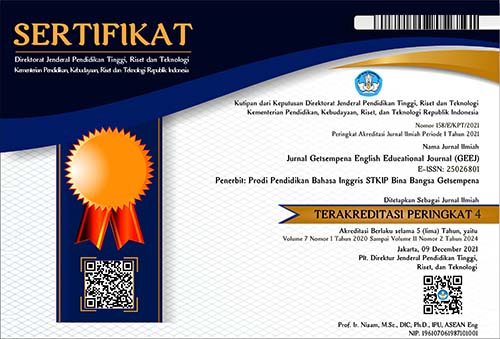ENHANCING STUDENTS’ LISTENING PROFICIENCY THROUGH THE INSTRUCTION OF (META)-COGNITIVE LISTENING STRATEGY
Abstract
Metacognitive listening strategy instruction is fruitful to enhance students’ autonomy by planning and deciding what the best strategy in mastering listening skills is. Meanwhile, the cognitive strategy instruction facilitates students to find out the solution to their listening problems. The study aimed to find out the effectiveness of (Meta)-cognitive listening strategy (M-CLS) instruction by administering the integrated listening strategy instruction between metacognitive and cognitive strategies on students’ listening proficiency. The participants were 38 EFL students of Universitas Muhammadiyah Semarang that consist of 20 for the experimental group and 18 for the control one. The M-CLS instruction that utilized the three stages including planning, monitoring, and evaluating stage was administered in experimental group for ten meetings. The quasi-experimental design was conducted to investigate quantitative data. The data were gathered by using a listening proficiency test adopted from TOEFL listening section. The descriptive statistics, Generalized Linear Model, and Paired Sample t-test reveal that the students in the experimental group achieve a higher score of listening proficiency with a significant achievement than those in the control group.
References
Amin, I. A. (2011). A Correlation Study Abetween EFL Strategic Listening and Listening Comprehension Skills among Secondary School Students. Retrieved from http://files.eric.ed.gov/fulltext/ED527448.pdf
Ary, D., Jacobs, L. C., Razavieh, A., & Sorensen, C. K. (2009). Introduction to Research in Education (8th ed.). USA: Wadsworth Publishing.
Attarzade, S., & Farahani, E. (2014). The Effect of Task Complexity on Iranian EFL Learners’ Listening Comprehension across Aptitude. Procedia - Social and Behavioral Sciences, 98, 314–323. https://doi.org/10.1016/j.sbspro.2014.03.422
Bidabadi, F. S., & Yamat, H. (2014). Strategies employed by Iranian EFL freshman university students in extensive listening: a qualitative research. International Journal of Qualitative Studies in Education (QSE), 27(July 2014). https://doi.org/10.1080/09518398.2012.737042
Cohen, L., Manion, L., & Morrison, K. (2007). Research methods in education (6th ed.). New York: Routledge.
Coskun, A. (2010). the Effect of Metacognitive Strategy Training on the on The Listening performance of beginner Students. Novitas-ROYAL, 4(1), 35–50.
Field, J. (2008). Listening in the language classroom. UK Cambridge: Cambridge University Press.
Goh, C. C. . (2000). A cognitive perspective on language learners’ listening comprehension problems. System, 28(1), 55–75. https://doi.org/10.1016/S0346-251X(99)00060-3
Guan, Y. (2014). The Effects of Explicit Listening Strategy Instruction on the Listening Comprehension of English as Second Language ( ESL ) Community College Students. Ph.D Thesis. University of San Francisco. Retrieved September 15, 2015 from http://repository.usfca.edu/diss.
Hariri, M. (2014). The Effect of Meta-cognitive Strategies Instruction on Listening Comprehension of Iranian Pre-intermediate Female EFL Learners. International J. Soc. Sci. & Education, 4(2), 437–442.
Harputlu, L. (2014). The effects of motivation and metacognitive strategy use on EFL listening proficiency. Procedia - Social and Behavioral Sciences, 158, 124–131. https://doi.org/10.1016/j.sbspro.2014.12.056
Hmoudova, D. El. (2013). The Impact of Learning Style Dimensions on Computer-based Key Language Competences Testing. Procedia - Social and Behavioral Sciences, 82, 411–416. https://doi.org/10.1016/j.sbspro.2013.06.284
Hossein, B. (2015). Less-skilled learners benefit more from metacognitive instruction to develop listening comprehension. International Journal of Research Studies in Languge Learning, 4(1), 3–12.
Kim, Y. S., & Phillips, B. (2014). Cognitive correlates of listening comprehension. Reading Research Quarterly, 49(3), 269–281. https://doi.org/10.1002/rrq.74
Lotfi, G. (2012). A questionnaire of beliefs on English language listening comprehension problems: Development and validation. World Applied Sciences Journal, 16(4), 508–515.
Lynch, T. (2011). Academic listening in the 21st century: Reviewing a decade of research. Journal of English for Academic Purposes, 10(2), 79–88. https://doi.org/10.1016/j.jeap.2011.03.001
Moradi, K. (2013). The Impact of Listening Strategy Instruction on Academic Lecture Comprehension: A Case of Iranian EFL Learners. Procedia - Social and Behavioral Sciences, 70, 406–416. https://doi.org/10.1016/j.sbspro.2013.01.078
Mulyadi, D. (2015). The Effect of Metacognitive Listening Strategies on Learners’ Listening Strategy and Their Listening Comprehension. In The First International Conference on Linguistics and Language Teaching (p. 311). Yogyakarta: Yogyakarta State University, 12-13 May 2015, ISBN: 978-602-7981-56-0.
Mulyadi, D., Rukmini, D., & Yuliasri, I. (2017). The Analysis of Students’ Listening Score on Different Learning Styles after Getting the Strategy Instruction Using English Movie with English Subtitle to Improve Students’ Listening Ability. Theory and Practice in Language Studies, 7(12), 1200–1209.
Nunan, D. (1994). Research methods in language learning. Cambriddge and New York: Cambridge University Press.
O’Malley, J. M., & Chamot, A. U. (1995). Learning Strategies in Second Language Acquisition. New York: Cambridge University Press.
Rahimi, M., & M. Katal. (2013). The Impact of Metacognitive Instruction on EFL Learners ’ Listening Comprehension and Oral Language Proficiency. The Journal of Teaching Skills (JTLS), 5(2), 69–90.
Rahimirad, M. (2014). The Effect of Metacognitive Strategy Instruction on the Listening Performance of EFL Students. Procedia - Social and Behavioral Sciences, 4(2), 1485–1491. https://doi.org/10.5296/ijl.v4i2.1707
Selamat, S., & Sidhu, G. K. (2011). Student Perceptions of Metacognitive Strategy Use in Lecture Listening Comprehension. Language Education in Asia, 2(2), 185–198. https://doi.org/10.5746/LEiA/11/V2/I2/A02/Selamat_Sidhu
Selamat, S., & Sidhu, G. K. (2013). Enhancing Listening Comprehension: The Role of Metacognitive Strategy Instruction (MetSI). Procedia - Social and Behavioral Sciences, 90(InCULT 2012), 421–430. https://doi.org/10.1016/j.sbspro.2013.07.111
Serri, F., Boroujeni, A. J., & Hesabi, A. (2012). Cognitive, Metacognitive, and Social/Affective Strategies in Listening Comprehension and Their Relationships with Individual Differences. Theory and Practice in Language Studies, 2(4), 843–849. https://doi.org/10.4304/tpls.2.4.843-849.

























